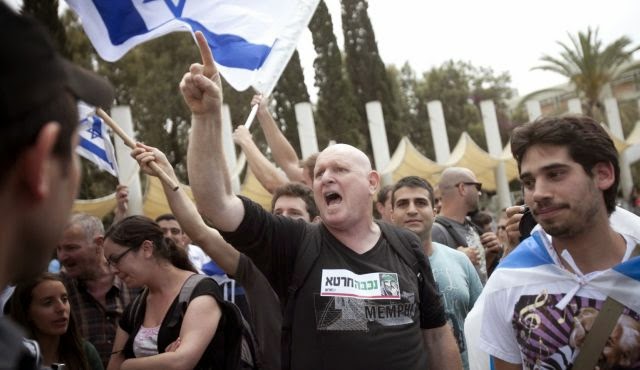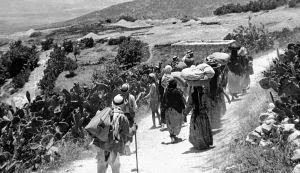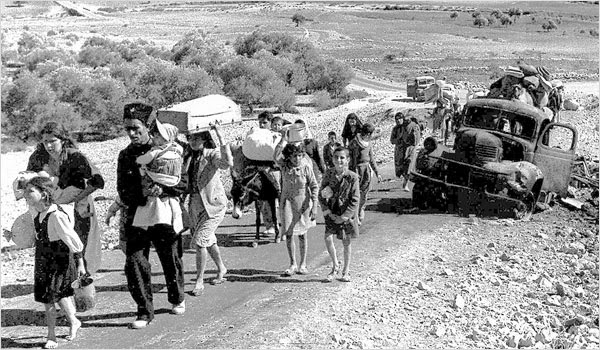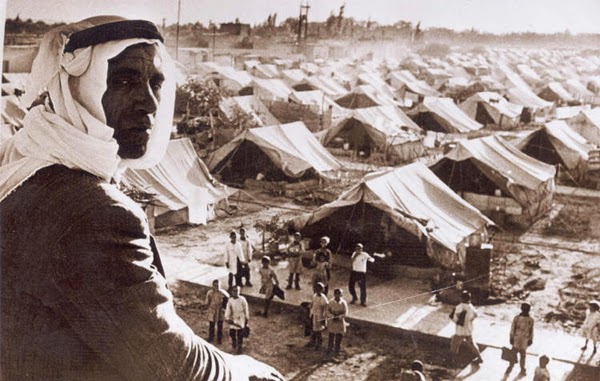Israelis rattled by search for truth about the Nakba
December 2014
First
‘truth commission’ avoids issue of reconciliation as veteran Israeli fighters
due to confess to 1948 war crimes
East Eye – 9 December 2014
first-ever “truth commission” in Israel, to be held on Wednesday, will feature
confessions from veteran Israeli fighters of the 1948 war who are expected to
admit to perpetrating war crimes as hundreds of thousands of Palestinians were
expelled from their homes.
commission is the culmination of more than decade of antagonistic confrontations
between a small group of activists called Zochrot, the Hebrew word for
Remembering, and the Israeli authorities as well as much of the Jewish public.
in 2002, Zochrot is dedicated to educating Israeli Jews about what Palestinians
call the Nakba, Arabic for catastrophe, referring to Israel’s creation on the
ruins of their homeland more than six decades ago. The group also campaigns for
the right of return for Palestinian refugees to Israel, probably the biggest
taboo in Israeli society.
commission, which has no official standing, could be the first of several such
events around Israel, to investigate atrocities and war crimes committed in
different localities, said Liat Rosenberg, Zochrot’s director.
looked to other such commissions around the world as models, most obviously in
South Africa,” she said. “But unlike the one there, ours does not include the
element of reconciliation because the conflict here has yet to be resolved.
cannot talk about reconciliation when the Nakba is ongoing. We are still in a
situation where there is apartheid, constant violations of human rights and 70
percent of the Palestinian community are refugees.”
commission is likely to provoke outrage from the Israeli government, which
passed the so-called Nakba Law
in 2011 to try to make it harder to commemorate Palestinian suffering. The
impact of the law is being widely felt. Just last month, the culture ministry
vowed to block a government grant to a Tel Aviv cultural centre that hosted a
Zochrot film festival on the Nakba.
Names kept secret
said Israeli veteran fighters and Palestinian witnesses participating in the
truth commission had asked for their names to be kept secret until the hearings
for fear that friends and family would put pressure on them to withdraw.
commission is being held in the city of Beersheva, a once-Bedouin town that was
ethnically cleansed in 1948 and is today the largest Jewish city in the Negev
region in southern Israel.
said it had chosen the city to host the first event event because forced
expulsions of Bedouin from the Negev had taken place not only in 1948, but had continued on a large
scale, out of view of observers, for many years afterwards.
commission is the latest project by Zochrot that discredits a traditional
Israeli narrative that some 750,000 Palestinians left under orders from Arab
leaders and that Israel’s army acted only in self-defence. Such beliefs have
fed into the common assumption from the Israeli public that Israel’s army is
the “most moral in the world”.
 |
| Israeli right-wingers try to stop commemoration of Nakba |
not just about researching the truth,” said Rosenberg. “The truth of the Nakba
is to a large degree known, but the task is to expose the truth to the Israeli
Jewish public – both so that it is forced to take responsibility for what happened
and so there can be accountability.”
commission is the direct result of a project launched by Zochrot two years ago
to create an alternative archive of the Nakba,
based on filmed testimonies from Palestinian refugees and Israeli veterans.
Activists fear that, as the generation of refugees and fighters dies off, they
will take their secrets to the grave.
military archives relating to the 1948 war began being opened to academics in
the late 1980s. This led to a group of so-called “new historians” overturning
the traditional accounts of that period and unearthing written evidence of
massacres and ethnic cleansing operations for the first time.
historians have reported in recent years that the Israeli authorities have
become more reluctant to open files and many of the more controversial episodes
of the 1948 war are still unclear.
hopes the commission will begin to fill some of the gaps.
to Rosenberg, three Israeli fighters and three Palestinian witnesses will
testify before a panel of six commissioners. The commissioners will then
question them further about events and make follow up recommendations.
hearings are due to be streamed online.
veteran of the fighting in the Negev, Amnon Neumann, has already gone on record in testimony
that can be seen in Zochrot’s film archive.
said the Bedouin in the Negev – contrary to popular Israeli perception – put up
almost no resistance to advancing Jewish forces because they lacked “a military
capacity” and “had no weapons”. Nonetheless, he said, the Israeli army
terrified the Bedouin villagers out of their homes by shooting either at them,
or above their heads.
them out. Women and children went to Gaza. … By the morning there was nobody
there. We burnt their houses,” Neumann said.
villagers tried to sneak back to tend crops or vineyards under the cover of
night, he recounted, the soldiers opened fire. “We would shoot and kill them.
This was part of the horrible things we did.”
filmed testimony, Mordechai Bar-On, an officer in 1948 with the Givati Brigade,
confirmed that orders were to shoot “infiltrators” – a reference to refugees
who tried to return to their villages.
I remember I told myself that we would do it. … There was an order to kill, not
even catch them,” Bar-On said.
most part, the Israeli veterans are coming forward now out of a feeling of
guilt.
time I did not see anything wrong with what we were doing,” Neumann said. “If I
was told to do things that I do not want to mention [here], I did them with no
doubts at all. … Not now. It is already 50, 60 years that I am filled with
regret.”
challenges remain, and despite veterans coming forward, piecing together events
can still be difficult.
said many of those giving filmed testimony, including Neumann, have been reluctant
to go into details of the war crimes they participated in. It is now hoped that
the questioning by the commissioners will encourage participants to be even
more forthcoming.
commission will also move beyond the 1948 period and examine expulsions in the
semi-desert Negev region, comprising nearly two-thirds of Israel’s landmass,
for the 12 years following the war.
from the rest of the new state of Israel, the Negev was largely unmonitored as
the Israeli military carried out expulsions of Bedouin throughout the 1950s,
said Raneen Jeries, a Zochrot organiser.
2,000 Palestinian inhabitants of al-Majdal, which later became the Jewish city
of Ashkelon, were put on trucks and shipped to Gaza nearly two years after the
war ended, according to Nur Masalha, a Palestinian historian and expert on
Israeli “transfer” policies.
said the legacy of the events of 1948 was being felt to this day, with policies
of expulsion continuing in the Negev and the occupied territories.
reporter Amira Hass revealed three months ago that
the Israeli military was planning to forcibly relocate for a second time the
Jahalin tribe. The tribe was driven out of the Negev in 1948 and fled to the
safety of the West Bank, then under Jordanian control. However, Israel occupied
the land after the 1967 war, and it seems that Israeli authorities now want to
expel some 12,500 Jahalin tribes people, this time to a site near Jericho.
had been successful in forcing Israelis to recognise the Nakba and a darker
side to the 1948 war, said Neve Gordon, a politics professor at Ben Gurion
University in Beersheva, where the truth commission is to be held.
ago, if I mentioned the Nakba in a class of 150 students, hardly any of them
would have known what I meant. Now 80 or 90 per cent would know,” Gordon told
MEE.
also attributed the change both to Zochrot’s activities and statements by Arab
legislators representing Israel’s large Palestinian minority, comprising a
fifth of the total population.
the issue of the Nakba has become more visible in Israel, sensitivity about it
has only grown. Ahead of Nakba Day last May, Prime Minister Benjamin Netanyahu
lashed out at the Palestinian Authority for commemorating the day, saying:
“They are standing silent to mark the tragedy of the establishment of Israel,
the state of the Jewish people.”
were educating their children with “endless propaganda” calling for the
disappearance of Israel, he said.
Minister Naftali Bennett went further, saying: “We need not tolerate Israeli
Arabs who promote Nakba Day.”
government has backed up its rhetoric with legislation, passing a Nakba Law in
2011 that denies public funds to institutions and organisations that
commemorate the Palestinians’ dispossession. The measure is partly seen as a
reaction to Zochrot’s growing success.
original legislation, which would have criminalised any commemoration of the
Nakba – making many of Zochrot’s activities illegal – was water-downed after
Israel came under strong international pressure.
Zochrot’s early years, its main efforts were directed at escorting Israeli Jews
and Palestinian refugees to some of the more than 500 Palestinian villages that
Israel destroyed during and after the 1948 war. The villages were razed to
prevent refugees from returning home.
remnants of most of the villages are now barely traceable, hidden under forests
planted by a charity called the Jewish National Fund or lost within gated
communities in which only Jews can live.
has continued such visits, placing signposts to remind the new Jewish
inhabitants that their communities are built on the ruins of Palestinian homes,
often belonging to neighbours living a short distance away. A large proportion
of Israel’s Palestinian minority were internally displaced by the 1948 war and
live close to their original homes but are barred from returning.
Bronstein, who founded Zochrot, said the current challenge was how to change
Israeli Jews’ perception of the Nakba.
recognise the word but what does it mean to them? Many, it seems, think it is
simply a negative label Palestinians have attached to Israel’s establishment.
We have an Independence Day that they call their Nakba,” Bronstein said.
to educate them about the events of the Nakba, what occurred and our
responsibility for it. They have to stop thinking of it as just propaganda
against Israel.”
wing, including the government of Benjamin Netanyahu, has grown increasingly
rattled by Zochrot’s agenda-setting programme of events.
popularity of a far-right youth movement, Im Tirtzu, has grown rapidly on Israeli
university campuses over the past few years, in part as a backlash to
commemorations of the Nakba by Zochrot and Palestinian students.
month, when Zochrot held its second Nakba and Right of Return Film Festival in
Tel Aviv, the culture minister, Limor Livnat, immediately threatened to pull a
government grant worth more than $450,000 from the cinema that hosted it.
state cannot bear the cost of funding of an entity that encourages debate over
what the Palestinians call ‘the right of return’,” Livnat said in a statement. She was
reported to have based her decision on her reading of the Nakba Law.
antagonism towards Zochrot and the idea of the Nakba is part of the educational
process,” said Bronstein. “It is a necessary phase Israel needs to pass through
if we are to get to a point of reconciliation.”
and others have faced angry opposition from the Israeli public and police as
they have tried to stage Nakba commemorations – most notably in Tel Aviv in
2012, when they were surrounded by riot
police for four hours. Three Zochrot activists were arrested.
Zochrot’s organisers, whose members include both Jewish and Palestinian
citizens, seem largely unfazed by the threats and hostility their group
generates.
Zochrot arranged a conference that for
the first time examined not just the principle of the right of return but
practical ways to implement it.
the group launched a phone app, called
iNakba, in three languages, which provides users with detailed maps and
information on the destroyed villages.
said it had had thousands of downloads, giving Israelis for the first time the
chance to peel away the subsequent layers of construction and forestation to
see what was destroyed, often on their doorstep.
more at:


